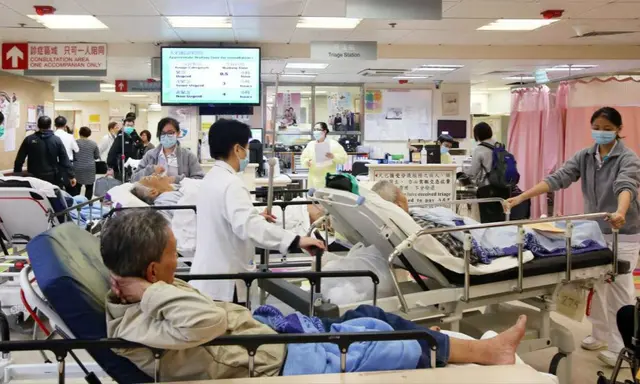Hong Kong’s overburdened public hospitals will have to cope with a massive rise in patient admissions by 2041, with the number of inpatient days almost doubling, a study has predicted.
Most of the increase will be due to a “silver tsunami” of ageing baby boomers – those born after the second world war – with the remainder the result of population growth.
According to the University of Hong Kong’s projection, the number of inpatient days will total 14.77 million in 2041, up from 8.21 million in 2012.
‘Baby boom period’
The substantial rise, according to Raymond Kwok Chi-leung – a post-doctoral fellow specialising in population projection at the university and lead author of the study – would first be observed in 2022.
“People born [during the baby boom period] will turn 65 years old by 2022,” he said.
The elderly would account for 76 per cent of the increase in inpatient days by 2041, up from 62 per cent in 2022. Researchers called the rise “predictable but inevitable”.
To handle the surge in demand, researchers suggested the length of stay for each patient should be reduced. Graphics: SCMP
Co-author Professor Paul Yip Siu-fai, of the university’s department of social work and social administration, said: “These are indeed alarming figures. If there is no intervention, the burden on public hospitals will be [as heavy as that].”
The figures were based on the government’s population projections and the fact that elderly people already accounted for almost half of total inpatient days in public hospitals.
"Longer queues"
Kwok warned of soaring costs for the government and rising demand for hospital beds as inpatient services now cost more than HK$4,500 a day for each patient and accounted for over half of public hospital expenditure.
It might also mean longer queues for treatment of chronic ailments such as heart disease, which is mostly suffered by older people.
To handle the surge in demand, researchers suggested that the length of stay for each patient, which was recorded at an average of 5.29 days in 2012, should be reduced to relieve pressure on the public health system, as long as the quality of care was not compromised.
Yip also suggested building extra hospitals and recruiting more foreign doctors.
The Census and Statistics Department expected that people aged 65 or above would account for up to 30.3 per cent of the city’s total population by 2014, up from 16 per cent this year.
The HKU researchers said Hong Kong faced a faster ageing process than Western countries.
"Every admission necessary?"
Dr Edward Leung Man-fuk, a private geriatrician who was not part of the study, said prevention of chronic diseases such as hypertension and diabetes was vitally important in cutting down hospitalisation rates.
The chairman of the Elderly Commission, Dr Lam Ching-choi, said primary care could be enhanced to support elderly people in the late stage of life. “Is every hospital admission necessary? Are there any procedures we can perform at home?”
A Hospital Authority spokesman said medical care had been provided to elderly in care homes to enhance community care. An online platform was also launched in 2013 to provide care tips to chronically ill elderly patients and their caregivers.
(SOUTH CHINA MORNING POST)
 简体中文
简体中文

